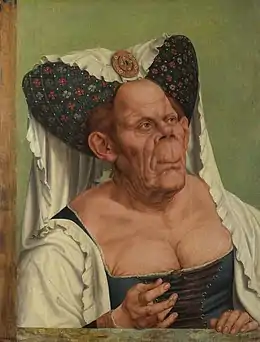Unattractiveness
Unattractiveness or ugliness is the degree to which a person's physical features are considered aesthetically unfavorable.

Terminology
Ugliness is a property of a person or thing that is unpleasant to look upon and results in a highly unfavorable evaluation. To be ugly is to be aesthetically unattractive, repulsive, or offensive.[1] There are many terms associated with visually unappealing or aesthetically undesirable people, including hideousness and unsightliness, more informal terms such as turn-offs.
History
Jean-Paul Sartre had a lazy eye and a bloated, asymmetrical face, and he attributed many of his philosophical ideas to his lifelong struggle to come to terms with his self-described ugliness.[2] Socrates also used his ugliness as a philosophical touch point, concluding that philosophy can save a person from their outward ugliness.[2] Famous in his own time for his perceived ugliness, Abraham Lincoln[3] was described by a contemporary: "to say that he is ugly is nothing; to add that his figure is grotesque, is to convey no adequate impression." However, his looks proved to be an asset in his personal and political relationships, as his law partner William Herndon wrote, "He was not a pretty man by any means, nor was he an ugly one; he was a homely man, careless of his looks, plain-looking and plain-acting. He had no pomp, display, or dignity, so-called. He appeared simple in his carriage and bearing. He was a sad-looking man; his melancholy dripped from him as he walked. His apparent gloom impressed his friends, and created sympathy for him—one means of his great success."[4]
Prejudice
Discrimination or prejudice against unattractive people is sometimes referred to as lookism or cacophobia (also aschimophobia),[5] and if it is a result of one's disfigurement, ableism.[6] Teratophobia is an aversion or fear of people who appear monstrous, have blemishes or are disfigured. When such an aversion is coupled with prejudice or discrimination, it may be viewed as a form of bullying.[7] With the dating world or courtship, judging others purely based on their outward appearance is acknowledged as an attitude that does transpire, yet is often viewed as an approach that is superficial and shallow.[8] Some research indicates a sentencing disparity where unattractive people tend to get heavier prison sentences than attractive people.[9]
Legality
There are some jurisdictions that already make it illegal to discriminate on the basis of immutable forms of aesthetic appearance, including the Australian state of Victoria, wherein lookism was made illegal in 1995.[10] Similarly, according to The Economist, Washington DC has laws that prohibit lookism.[11]
See also
References
- Perpinyà, Núria (2014). Ruins, Nostalgia and Ugliness. Five Romantic perceptions of Middle Ages and a spoon of Game of Thrones and Avant-garde oddity. Berlin: Logos Verlag.
- Martin, Andy (August 10, 2010). "The Phenomenology of Ugly". The New York Times. Retrieved August 24, 2010.
- "David S. Reynold's Book 'Abe' Reveals New Information About Lincoln". NPR.org. 29 September 2020. Retrieved 29 September 2020.
- Carpenter, F. B. (1866). Six Months at the White House with Abraham Lincoln. New York: Hurd and Houghton. ISBN 1-58218-120-9.
- Warhurst, Chris; van den Broek, Diane; Hall, Richard; Nickson, Dennis (February 2009). "Lookism: The New Frontier of Employment Discrimination?". Journal of Industrial Relations. 51 (1): 131–136. doi:10.1177/0022185608096808. ISSN 0022-1856.
- Reel, Justine J.; Bucciere, Robert A. (2010). "Ableism and body image: Conceptualizing how individuals are marginalized". Women in Sport and Physical Activity Journal. 19 (1): 91–97. doi:10.1123/wspaj.19.1.91.
- Steinberg, Neil. "Facial discrimination: Living with a disfigured face". CNN. CNN. Retrieved 30 August 2016.
- de Jong, Michelle; Collins, Anthony (2017). "Love and looks: A discourse of romantic love and consumer culture". Acta Academica. 49 (1): 84–102. doi:10.18820/24150479/aa49i1.5.
- McKelvie, Stuart J.; Coley, James (1993). "Effects of crime seriousness and offender facial attractiveness on recommended treatment". Social Behavior and Personality. 21 (4): 265–277. doi:10.2224/sbp.1993.21.4.265.
- Harris, Candice; Small, Jennie (2013). "Obesity and hotel staffing: Are hotels guilty of 'lookism'?". Hospitality & Society. 3 (2): 111–127. doi:10.1386/hosp.3.2.111_1.
- "The line of beauty". The Economist. 27 August 2011.
